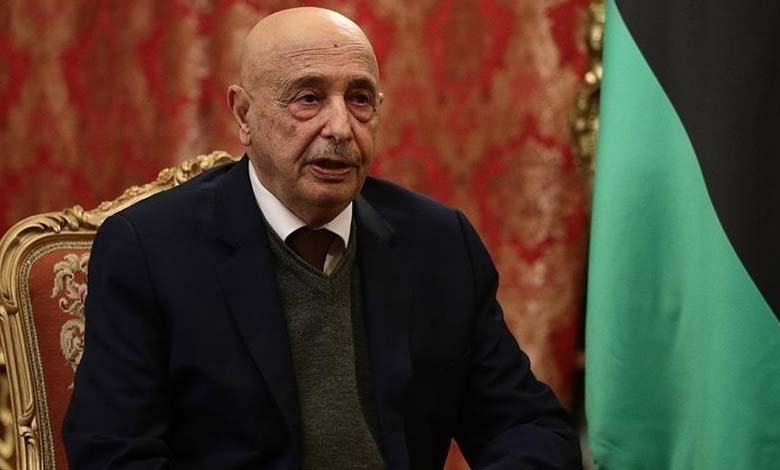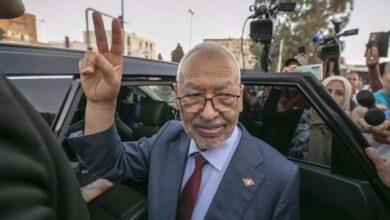Al-Mishri and Aguila Saleh discuss steps to form a new government in challenge to Dbeibah

In a move that adds to growing political tension, Libyan Speaker of Parliament Aguila Saleh met with Khaled Al-Mishri, who remains an influential figure within the High Council of State despite an ongoing dispute over his legitimacy with Mohamed Takala. During an unannounced meeting on Monday, the two discussed practical steps to form a new unified government, amid escalating political and public pressure on the current Prime Minister of the Government of National Unity (GNU), Abdulhamid Dbeibah.
-
Counterfeit Billions in Libya Prompt Dbeibah to Demand Immediate Investigation
-
Escalating Tensions Between Dbeibah and Parliament Over Parallel Spending
According to a statement from the Parliament’s media office, the meeting focused on “recent political developments and practical steps to establish a clear roadmap leading to the formation of a unified government, paving the way for simultaneous presidential and parliamentary elections.” The statement did not disclose the meeting’s location, but its secrecy raises questions about the future political balance in the country.
Dbeibah, appointed under the 2021 Geneva Libyan Political Dialogue Forum, has repeatedly rejected any proposal to hand over power to a non-elected interim government. He insists his government must remain in place until elections are held, a goal still out of reach due to unresolved constitutional and political disputes.
-
Dbeibah Turns to the Muslim Brotherhood, Haftar Warns of Decisive Moment… Libya on a Knife’s Edge
-
Dbeibah Sidesteps Resignation Calls by Proposing Direct Elections
Nevertheless, Saleh and Al-Mishri‘s efforts appear to aim at creating a new political reality, especially as Dbeibah’s domestic popularity wanes due to deteriorating living conditions, repeated protests, and allegations of corruption and poor governance. These challenges have fueled mounting calls for his removal.
Despite this initiative, the United Nations Support Mission in Libya (UNSMIL) has voiced firm opposition to any governmental changes that are not based on broad consensus. Still, Saleh and his Eastern allies continue to push forward with the idea of an alternative government, potentially exacerbating institutional division.
-
How Dbeibah Planned to Eliminate His Former Ally “Gheniwa” – A BBC-Affiliated Report Reveals
-
Gheniwa’s Blood Strangles Dbeibah… Tripoli’s Nero Burns in His Own Fire
Al-Mishri’s renewed political activity raises eyebrows, particularly given his ongoing rivalry with Takala over leadership of the High Council of State. The council has failed to resolve this internal dispute for over a year, undermining the legitimacy of any political deal mediated by Al-Mishri.
Previous remarks by Dbeibah suggesting he would not hesitate to use military force to “protect legitimacy in Tripoli” have stoked fears of another armed confrontation, especially if actors from both East and West try to impose a government outside the international framework. While Dbeibah retains control over Tripoli with the backing of powerful armed groups, some factions have begun voicing discontent.
-
Dbeibah defends decisions to neutralize armed groups despite rising violence
-
Protests in Tripoli Call for Dbeibah and His Government to Step Down
The ongoing failure to hold elections has opened the door to unilateral initiatives that could deepen divisions or spark violent power struggles. And although Saleh and Al-Mishri present their efforts as a bid for a “unified government,” observers warn that any cabinet formed outside UN-led consensus and without full stakeholder inclusion would effectively become a parallel government — echoing the institutional split that plagued Libya between 2014 and 2020.
Libya’s future thus hangs between two paths: one leading to a new political structure through a comprehensive agreement that enables long-awaited elections, and another dragging the country back into cycles of division and contested legitimacy.
-
Financial Strangulation and Stalled Dialogue with Haftar Threaten Dbeibah’s Government Continuity
-
Mohammed el-Menfi intensifies pressure on Dbeibah by criticizing spending file
-
Dbeibah after the Blinken meeting : Libya mercenaries must leave
-
Head of Egyptian Intelligence in Tripoli and supplies for al-Dbeibah visit
-
Accusations of Bias Target UN Mission in Libya












